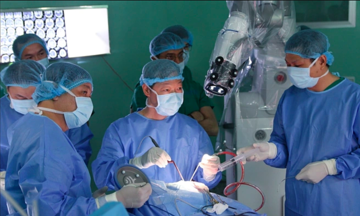Chronic kidney disease (CKD) affects nearly 850 million people worldwide and is currently the third fastest growing cause of death globally. In Vietnam, over 10 million people suffer from the disease, accounting for 10.1% of the population. Mortality due to chronic kidney disease ranks 8th among the top 10 causes of death in the country.
Doctor Nguyen An Chau, specializing in Internal Medicine at Minh Anh International Hospital, says maintaining a healthy lifestyle and controlling underlying medical conditions can help prevent CKD.
Maintaining an active lifestyle is crucial for kidney health. Regular exercise not only offers aesthetic benefits but also plays a vital role in reducing the risk of CKD. Physical activity helps lower blood pressure and improves cardiovascular health, two key factors in protecting the kidneys from damage.
Various activities like walking, running, cycling, and even dancing are beneficial. Choose an activity that keeps you engaged and you find enjoyable to avoid boredom, making it easier to stick to your routine and achieve desired results.
Managing blood sugar levels is essential, especially for individuals with diabetes, who are at a higher risk of kidney damage. When the body's cells cannot effectively use glucose (sugar) in the blood, the kidneys have to work harder to filter the blood. Good blood sugar control significantly reduces this risk. Early detection of kidney damage allows for timely medical intervention to slow or prevent further damage.
Monitoring blood pressure is also important as high blood pressure can damage the kidneys. This risk increases when high blood pressure is combined with other health issues like diabetes, heart disease, or high cholesterol. A healthy blood pressure reading is 120/80. Readings between 120/80 and 139/89 are considered prehypertension, a stage where lifestyle and dietary changes can effectively control blood pressure.
However, if your blood pressure consistently reads above 140/90, you may have hypertension. Consult a doctor for advice on regular monitoring, lifestyle adjustments, and medication if necessary.
Monitoring weight and maintaining a balanced diet are important factors in kidney health. Overweight or obese individuals have a higher risk of health conditions that can lead to kidney damage. A balanced diet, low in salt, processed meats, and other unhealthy foods, can help mitigate this risk. Focus on consuming fresh, low-sodium ingredients like cauliflower, blueberries, fish, and whole grains to protect and maintain healthy kidney function.
 |
Regularly eating fish helps protect and maintain healthy kidney function. Photo: Bui Thuy |
Drinking plenty of water is a simple yet effective way to support kidney health. While there's no magic behind the advice to drink 8 glasses of water daily, it's an excellent goal for staying hydrated. Regular water intake helps the kidneys flush out sodium and toxins, reducing the risk of CKD. Aim for at least 1.5 to 2 liters of water per day. The exact amount depends on factors like climate, activity level, gender, overall health, and pregnancy or breastfeeding status. Individuals with a history of kidney stones should drink more water to prevent recurrence.
Avoiding tobacco is crucial for kidney health. Smoking damages blood vessels, slowing blood flow to organs, including the kidneys. This not only impairs kidney function but also increases the risk of kidney cancer. Quitting smoking gradually reduces this risk, though it can take years to return to the same risk level as a non-smoker.
Being mindful of daily medication intake, especially over-the-counter (OTC) pain relievers, is important as frequent use can severely damage kidneys. Nonsteroidal anti-inflammatory drugs (NSAIDs), including ibuprofen and naproxen, can be harmful if taken regularly for chronic pain, headaches, or arthritis. Kidney specialists advise against using these medications for more than 10 days for pain or 3 days for fever. Taking more than 8 aspirin tablets daily can temporarily or permanently impair kidney function.
If you experience frequent pain and rely on these medications, consult your doctor for safe treatment alternatives to protect your kidneys.
Regular kidney function checks are essential for high-risk individuals. The following groups should be particularly vigilant: People over 60; those born with low birth weight; individuals with heart disease, hypertension, or diabetes; those with a family history of hypertension, diabetes, or kidney disease requiring dialysis or transplant; people who are obese; and those experiencing kidney-related symptoms.
US Italy












